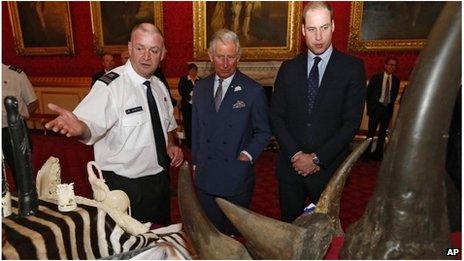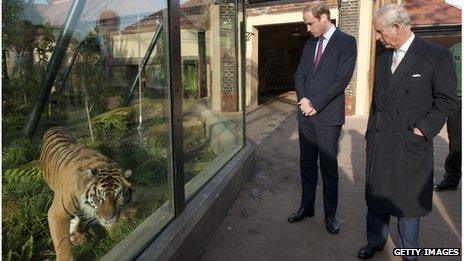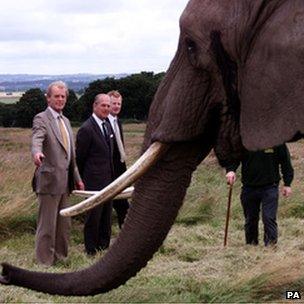Princes Charles and William 'unite for wildlife'
- Published
Prince William and Prince Charles: "Let's unite for wildlife"
They are seated side by side, looking straight into camera - two future British kings with a message that matters deeply to them.
Both Charles and William are passionate in their support for the world's endangered wildlife, and increasingly exercised by the threat posed to that wildlife by organised criminal gangs which slaughter animals for their tusks or horns or other body parts.
As Charles says in the unprecedented video message which launches their anti-poaching campaign, the numbers being killed are "staggering": nearly 100 elephants killed every day - a rhinoceros killed every 11 hours - a wild tiger population which, a century ago, numbered around 100,000 and which, today, has been reduced to an estimated 3,200.
There is, he says, an apparently "insatiable" demand, much of it from Asia, which is driving this trade and which is giving rise to levels of killing and related violence which has not been witnessed before.
Father's footsteps
For the British royal family, a commitment to the cause of conservation is a long-standing one.
Charles's father, Prince Philip - the husband of the Queen - was one of the original founding fathers of the World Wildlife Fund, now the World Wide Fund for Nature.
Half a century ago, he travelled the world urging audiences to pay greater attention to the needs of the natural world.
And just as Charles followed in his father's footsteps, William has done the same - three generations of royals each of whom has been drawn to the African bush and the majesty of its wildlife.

The princes are both "passionate" campaigners against the illegal wildlife trade
Partly, of course, it's because - in political terms - wildlife conservation is a safe cause for them to adopt.
These are high-profile figures who face a lifetime on the public stage and who need something to justify their positions.
They are not expected to adopt any cause which will bring them into a politically contentious area (though it must be said that hasn't always stopped Charles) and saving wildlife is one of those subjects which gives them an international platform on an issue of genuine long-term importance to the world.
Prince's birth
So while championing wildlife may suit the purposes of royals looking for something to do, in the case of Princes Philip, Charles and William there is no question that their commitment is both deep and sincere.
Nobody who has seen them at close quarters can doubt that their interest is real.
In the latest video we hear Charles expound on one of his central beliefs that "humanity is less than humanity without the rest of creation".
And we gain a further insight into the impact Prince George's birth has had on William, heightening his determination to "protect the resources of the Earth" for his own son and the other children of his generation.

The princes' plea is the latest evidence of a long-standing interest in wildlife
Yet there can also seem to be an ambiguity in the royals' attitude to wild animals.
In the days of the British Empire, kings, queens and princes were enthusiastic participants in the fashionable and largely aristocratic pastime of hunting big-game in Africa and India.
Scores of lions, tigers, elephants and antelopes have perished at the hands of the royals.
Even in comparatively recent times, in the early years of the present Queen's reign, Prince Philip has been known to blast away successfully at tigers in India.
One royal correspondent had the temerity to ask him how he reconciled his game-hunting days with his role in the World Wildlife Fund.

Prince Philip has worked to protect animals - but he also shot tigers decades ago
It was probably fortunate for that royal correspondent that Philip didn't have his 12 bore to hand at the time.
Suffice it to say that he got the rough end of his tongue, and the question was never properly answered.
'Deeply held objective'
Even today, William has raised quite a few eyebrows by heading off to Spain for a weekend to shoot deer and wild boar on a private estate just as he and his father prepared to launch their campaign against the illegal wildlife trade.
It's hard to see it as anything other than ill-judged; an own-goal which risks deflecting attention away from their wish to rally opinion against the gangs slaughtering animals in Africa.
That campaign will climax when representatives of some 50 countries sit down in the imperial splendour of Lancaster House near Buckingham Palace later this week.
Charles and William will both be there, two future kings canvassing support and campaigning together on behalf of a deeply held joint objective.
Why, they even have a campaign slogan - "Let's unite for wildlife" - and, on this issue, they feel they have a duty to put their joint royal prestige and influence to work in a way we haven't seen before in public.
- Published9 February 2014
- Published19 June 2012